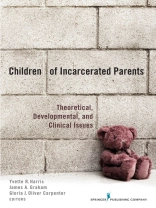‘This important book covers developmental outcomes of children in this predicament, parenting from prison, and family reunification. It is filled with research findings and addresses clinical issues as well. Many children are affected by a parent in the criminal justice system, and this book is sorely needed. The editors and contributors have produced a wonderful resource.’ Score: 94, 4 stars
–Doody’s
This book serves as a comprehensive source for understanding and intervening with children of incarcerated parents. The text examines the daunting clinical implications inherent in trauma throughout development, as well as social and political roles in ameliorating intergenerational delinquency. It conceptualizes the problem by using an ecological framework that is focused on the experience of the child.
Children of Incarcerated Parents addresses developmental and clinical issues experienced throughout the trajectory of childhood and adolescence with a focus on interventions and social policies to improve outcomes for this under-studied group. The chapters explore individual, community, and national levels of policy, programming, and legislation.
Inhoudsopgave
‘
Section One: Framework
Chapter One: The Changing Landscape in the American Prison Population: Implications for Children of Incarcerated Parents
Chapter Two: Parents ”in the System:” An Ecological Systems Approach to the Development of Children with Incarcerated Parents
Section Two: Developmental Trajectories
Chapter Three: Children of Incarcerated Parents: Developmental Trajectories Among School-Age Children
Chapter Four: Children of Promise
Section Three: Environmental Considerations
Chapter Five: The Effects of Incarceration on Neighborhoods and Communities
Chapter Six: Living Arrangements of Children of Incarcerated Parents: The Roles of Stability, Embeddedness, Gender, and Race/Ethnicity
Section Four: Parenting from Prison
Chapter Seven: Building Partnerships to Strengthen Families: Intervention Programs and Recommendations
Chapter Eight: Strengthening Parent-Child Relationships:Visit Coaching with Children and their Incarcerated Parents
Section Five: Current and Future Directions
Chapter Nine: Child Welfare Legislation and Policies: Foster Children with a Parent in Prison
Chapter Ten: Service Planning and Intervention Development for Children of Incarcerated Parents
Chapter Eleven: The Challenge of Family Reunification
Chapter Twelve: Research and Intervention Issues for Moving Forward with Development in Children of Incarcerated Parents:
‘Over de auteur
Gloria Oliver Carpenter, Ph D, is an assistant professor of Psychology at Northern Kentucky University, Department of Psychological Sciences.












